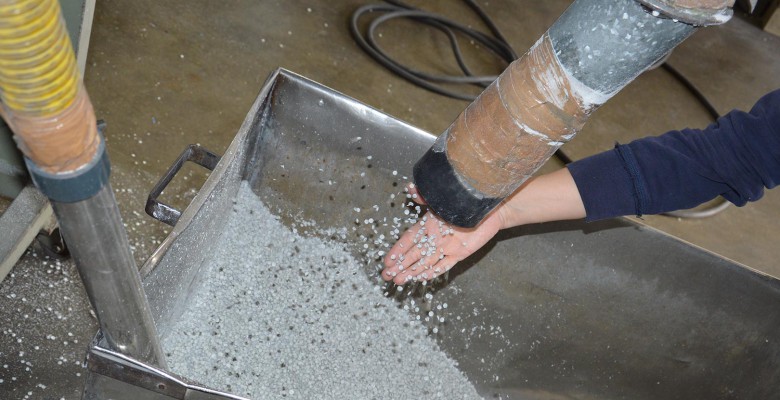PVC RECYCLING AND ENERGY RECOVERY
PVC is one of the most easily recyclable plastic materials from a technical point of view.
Its separation from the other plastic materials collected by separate collection is extremely facilitated by the chlorine component, represented by a “mark” automatically recognized by the X-rays detector during the automatic selection processes.
The operations of PVC mechanical recycling are easy and they do not cause any significant impact on the environment.
Once the PVC is separated from the other materials, is cleaned and purified from the residual traces of the content, from the contamination with other garbage and components of different materials (such as, the paper of the labels, other plastics and the metal of the caps) and then it is shredded in flakes and micronized to dust.
At this point, recycled PVC is ready to be used again. Recycled PVC keep unaltered its physical-mechanical features and it is widely usable, with excellent results, even in the case of other plastic material traces (such as, for example PET) remain incorporated in the material.
PVC remains a perfectly stable material and chemically inert, safe during the transformation and in the employment.
For recycling PVC there is a growing demand market, especially in the sector of the industrial products.
There are a lot of examples of application; from the tubes manufactured completely in recycled PVC to the multi-layers tubes (with main layer – equals to the 60% – in recycled PVC), from printed accessories, floors, sweaters, shoes to flasks for not-alimentary goods.
The energy recovery
PVC waste that escape from the separate collection circuits end up in the incineration plants or in the dump.
The incineration plants must – pursuant the new national legal provisions – be equipped with energy recovery systems. They must be able to recover, in thermal energy or electric energy, from waste heat.
This option of recovery is known as “waste to energy”.
The energy content of waste is fundamental in order to optimize the waste to energy plants’ performance. Higher is the heating and higher will be the quantity of thermal or electric energy produced by the plant.
The PVC represent a small part of the household waste (less than 1%) but it provides energy input, having an intermediate heating value between the paper and wood’s ones.
GPlast is specialized in the regeneration of PVC plastic material: we use recycled plastic and we transform the PVC granules for different uses, so we protect the environment from the plastic pollution and offering high quality products that is employed for the tubes manufacturing into ducts and in various profiles used in the construction and industrial sectors.
Are you interested in our PVC granules?
CONTACT US




Leave A Comment